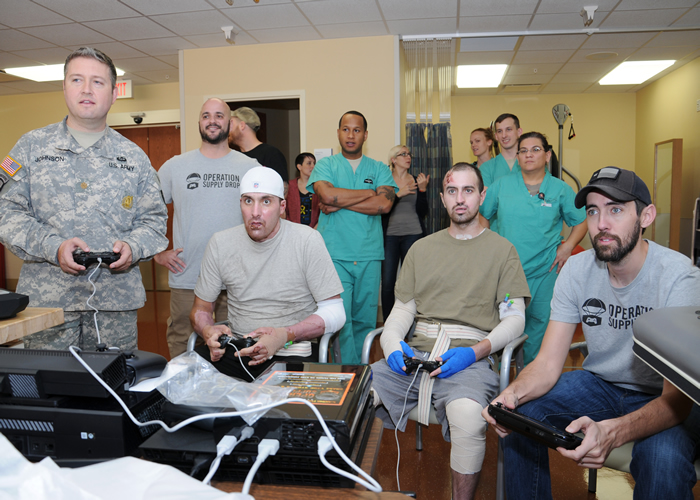Operation Supply Drop Donates Video Games to Burn Center for Rehab Therapy

Video games are proving to be effective physical and occupational therapy tools throughout rehabilitation centers. Until recently, burn patients at the U.S. Army Institute of Surgical Research Burn Center at Fort Sam Houston, Texas, did not have that option, but now thanks to a generous donation Nov. 18 by Operation Supply Drop, video games will be available for rehab patients.
OSD is a nonprofit organization devoted to sending video game care packages to deployed service members overseas and wounded warriors recovering in military hospitals. Glenn Banton, OSD chief executive officer, said the concept of his organization is to send warriors video games as a distraction from being deployed to a war zone or recovering in a hospital.
"It also builds morale and comradery," said Banton.
Maj. Erik Johnson, chief of Occupational Therapy at the Burn Center, met members of OSD at a video game convention in San Antonio. Johnson was later introduced to Banton where they discussed OSD's mission and how they support military Service Members and veterans. Banton and Johnson also discussed the lack of video game equipment at the Burn Center Rehab Unit and the benefits of using that equipment as a rehabilitation tool.
"Glen told me to get him a wish list, and I told him that we would be grateful for anything," said Johnson. "When OSD presented the donation, I couldn't believe that they provided everything on the list and a ton more."
OSD donated the latest video gaming consoles with games, peripherals and gear that burn patients can use in their daily rehab routines.
"We're just thankful and excited to see how our organization can contribute to the Burn Center and help burn patients benefit from the equipment," said Banton.
Burn Center patient Severo Martinez, Jr., was one of the first patients to use the video games as part of his rehab regiment. Martinez was injured in a motorcycle accident which caused severe road burn injuries to both of his hands. Playing a video game and using the controller has helped gain some range of motion in his hands.
"I think that it's a great tool for rehab," he said. "When I'm playing a video game I'm not thinking about the pain in my hands when I press the buttons on the controller. I've seen a difference after only playing a few days."
Johnson has been incorporating the use of video games into his rehab treatment plan for several years. He added that it's no secret that people respond a lot better to therapy doing something they enjoy rather than repetitious exercises.
"If a patient loves cars and driving than what a better way to work range of motion than to actually have them engage in a video game driving simulator?," said Johnson. "There's really no limit to the potential use of gaming as a therapeutic tool."
Johnson said that people often laugh at him when he refers to video games as therapeutic tools, but as a burn patient himself, he knows the benefits of using video games for rehab therapy. During his first tour of duty as an enlisted Soldier in Germany in 1996, Johnson was in a traumatic vehicle accident where he suffered burns to more than 20 percent of his body. While being treated at the Burn Center where he now works, Johnson was inspired to help other burn victims suffering similar injuries. As new video games and equipment were being introduced in the market, Johnson figured of ways of applying the new devices into physical therapy.
"You can use the new systems for anything from range of motion in the upper extremities to balance activities and even working on cognition issues for patients who have suffered a brain injury," he said. "One of the things I see happen when we engage patients with this type of therapy is a huge boost in their emotional state. Patients often struggle with a lot of psychosocial issues after suffering a burn, and anything that we can do to get them some positive emotional feedback is a huge deal for us."
 An official website of the United States government
An official website of the United States government
 ) or https:// means you've safely connected to the .mil website. Share sensitive information only on official, secure websites.
) or https:// means you've safely connected to the .mil website. Share sensitive information only on official, secure websites.


